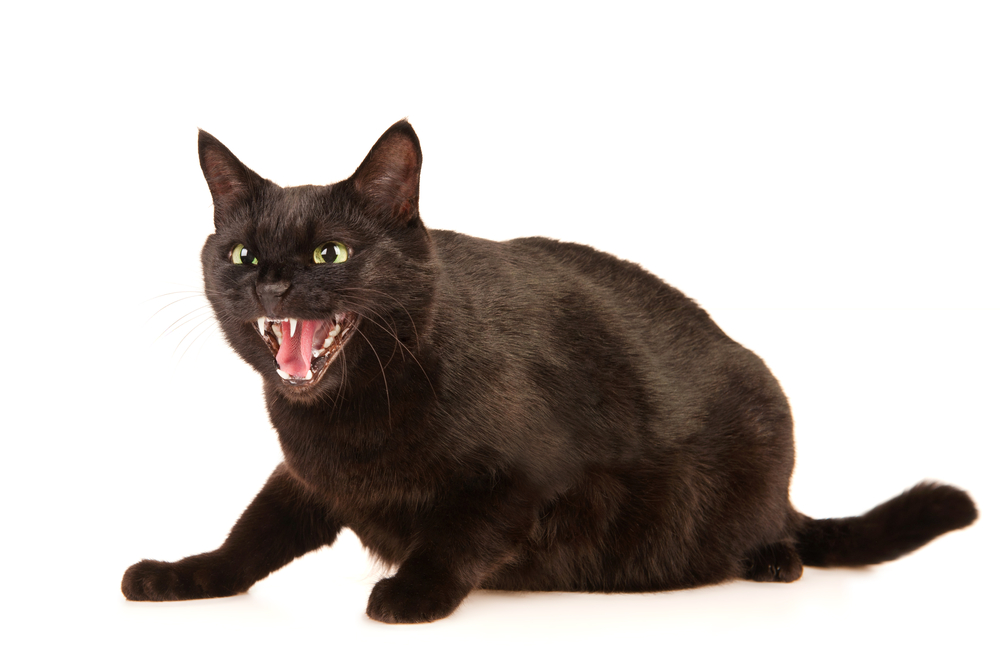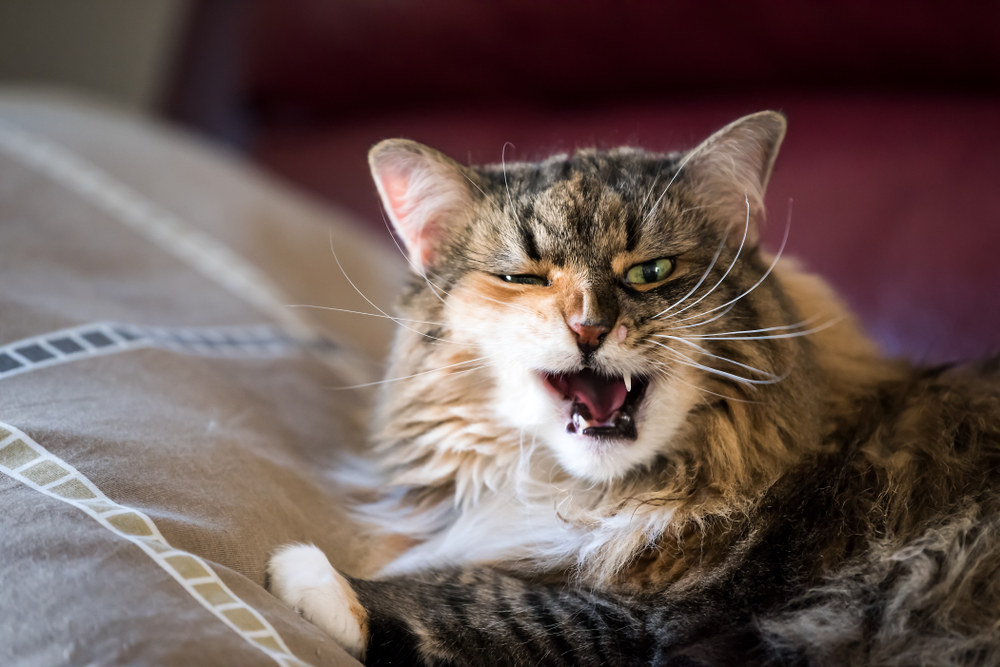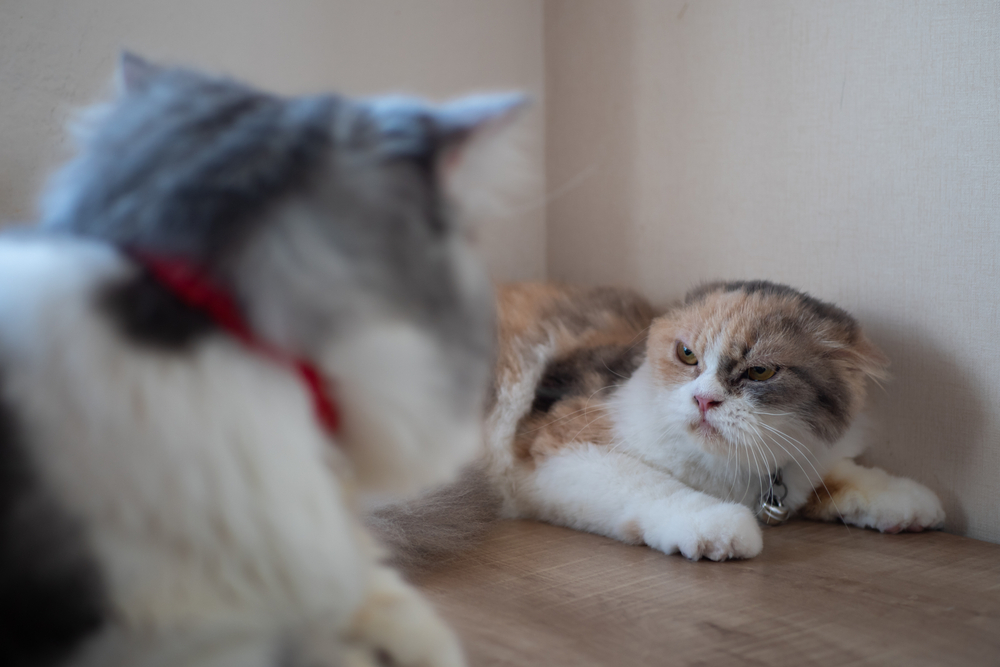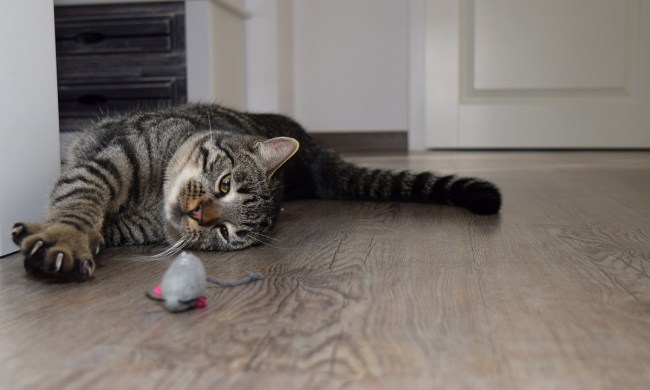Being a pet parent comes with a lot of responsibilities, but sharing your home with a feline fur baby is one of the most rewarding experiences you can have. Have you recently decided to bring a new kitten into your home? You were undoubtedly hoping it would be smooth sailing, but you haven’t done anything wrong if your cat hisses at your new kitten.
As it turns out, there are a few perfectly logical reasons behind this puzzling behavior. If you’ve ever wondered why cats hiss at kittens, you’ve come to the right place. We’ll explain the reasons for your cat’s upsetting response to the newest member of the household – and we’ll tell you how to stop it.

Is it bad if my cat hisses at a new kitten?
According to Marietta, Georgia-based cat hospital Paws, Whiskers, and Claws, it’s perfectly normal for your cat to hiss at a new kitten. Ingrid Johnson, a cat behavior consultant at Fundamentally Feline, says, “Don’t be alarmed; it’s normal for cats to hiss at something new or something they don’t understand.” Your cat is trying to tell your new kitten not to come any closer. It’s also possible that your cat might hiss at you and other members of the family after you’ve introduced a new kitten to the household.
Cats strongly depend on their olfactory sense to communicate and navigate the world around them. New kittens smell unlike anything your cat has ever smelled before. Imagine how confusing it must be for a cat when her home suddenly smells like a stranger. Even worse – because you interact with your new kitten, you also smell foreign to your cat. Fortunately, we have some good news. Given time and space, your cat will come to accept your new kitten, and harmony will be restored to your home. (Well, it will be as harmonious as any cat lover’s household can be.)
How do I get my cat to stop hissing at my new kitten?
Some cats are relentlessly good-natured and might bond with your new furball instantly. Others might feel protective of their home and their human family members. Luckily, most cats settle down quickly enough. However, if the fur continues to fly, we have some tips you can use to calm things down. In order to allow the situation to cool off, you’ll need to start from scratch and pretend your cats have never met. (This is also the ideal way to introduce a new kitten.)

Start off slowly
If possible, allow your current cat and your new kitten to stay in their own rooms for the first few days or so. Your cats will become accustomed to smelling each other in the home – and on you. Once they seem to be doing well, try bringing a blanket from your new kitten’s room into your cat’s room and vice versa; you can also swap out their toys. Anything that allows them to get used to the other cat’s scent and equate her presence with something reassuring (like a blanket) or fun (like a toy) will help your fur babies adjust sooner.
Control their initial interactions
When you first introduce your cats, try keeping them separated by a baby gate or by keeping one of them in a kennel. Give them time to see each other and to get used to being in the presence of another cat. Make sure to pet both cats and give them treats, as this creates an association between being together and receiving a reward.
Allow them to spend time together
When your cat and your new kitten can spend time in the same space without displaying fearful or aggressive behavior, you can remove the barrier. Please refrain from physically or verbally disciplining your cat if she begins to hiss. Not only is punishment ineffective, but you might actually cause your cat to fear you. Hissing serves as a warning to your new cat not to come any closer. As long as your cats aren’t fighting, it’s best not to intervene.
Don’t force them to share
Cats can be very possessive over resources, such as food and water, scratching posts, and litter boxes. To help reduce behavioral issues, make sure each cat has her own food, water, toys, bedding, and litter box. It might even be a good idea to keep their resources separate to begin with. When a cat feels safe and doesn’t have to share, she’ll feel much more secure, and therefore more likely to accept your new kitten.

How long does it take a cat to accept a new kitten?
As much as we would love to say that your cat and your new kitten will be the best of friends in a matter of weeks, that usually isn’t the case. There are numerous factors to consider when it comes to your cat’s acceptance of your newest family member. Your cat’s age, sex, and temperament all play a vital role in her ability to adjust to your new kitten. Just like humans, cats are individuals. While some are friendly and make friends easily, others are more reserved and need a longer adjustment period to accept new feline fur babies. So, how long does it take for a cat to accept a new kitten? On average, it takes cats somewhere between 8 months to a full year before they’ll be able to fully accept that the newest addition to your home isn’t going anywhere and (hopefully) begin to build a friendship with your new kitty. However, that doesn’t always happen. Your cats might simply tolerate each other, and that’s okay too. As long as they don’t fight constantly, you should allow your cat to befriend – or ignore – your new cat.



